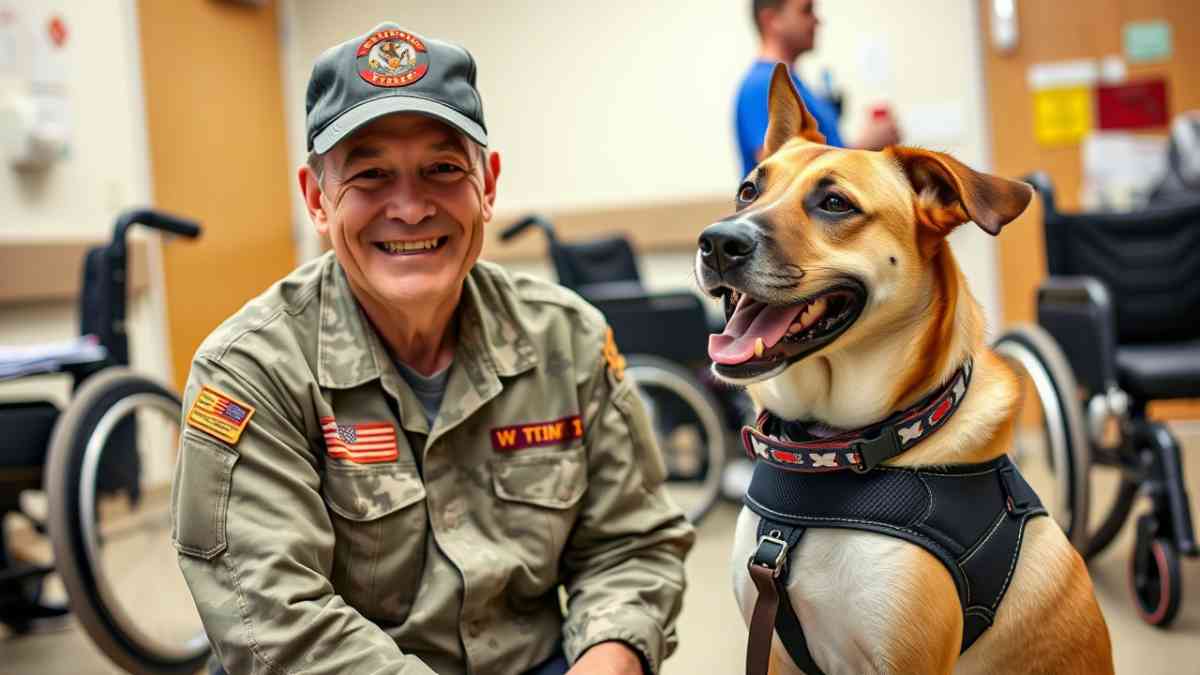Introduction
Veterans often face physical and emotional challenges after military service. Organizations like Paws for War provide trained service dogs to support veterans in their transition to civilian life. These service animals offer companionship, emotional stability, and practical assistance. This guide explores how Paws for War operates, the benefits of service dogs, and how you can support this mission.
What Is Paws for War?
Paws for War is a nonprofit organization dedicated to rescuing, training, and placing service dogs with veterans in need. Their mission is to improve the lives of military personnel struggling with PTSD, anxiety, mobility issues, and other service-related disabilities.
The Role of Service Dogs in Veterans’ Lives
Service dogs provide more than just companionship; they offer essential support in daily activities, helping veterans regain independence. Their roles include:
- Emotional Support – Reducing anxiety and PTSD symptoms.
- Physical Assistance – Helping veterans with mobility issues.
- Alerting to Medical Conditions – Detecting seizures, low blood sugar, or other medical emergencies.
- Providing Security – Offering comfort in crowded or stressful environments.
How Paws for War Selects and Trains Service Dogs
The organization follows a strict selection and training process to ensure each dog is well-suited for their veteran handler:
- Rescue and Selection – Dogs are chosen based on temperament, intelligence, and health.
- Specialized Training – Each dog undergoes months of professional training tailored to the veteran’s needs.
- Veteran Matching – Handlers are carefully paired with a service dog.
- Ongoing Support – Continuous training and assistance are provided after placement.
Benefits of Service Dogs for Veterans
Service dogs offer numerous advantages for veterans, including:
- Reducing PTSD Symptoms – Service dogs provide emotional grounding and comfort.
- Enhancing Social Interaction – Encouraging veterans to engage more with family and friends.
- Improving Sleep and Mental Health – Offering a calming presence at night.
- Boosting Independence – Assisting in everyday tasks and increasing confidence.
How to Support Paws for War
There are several ways to contribute to this noble cause:
1. Donate
Financial contributions help cover the costs of training and placing service dogs.
2. Volunteer
Opportunities include fostering dogs, assisting with training, and supporting events.
3. Spread Awareness
Sharing Paws for War’s mission on social media or within your community can help attract more supporters.
4. Sponsor a Veteran-Dog Pair
Some programs allow donors to fund the pairing of a veteran with a service dog.
Real Stories: Veterans and Their Service Dogs
Many veterans have experienced life-changing improvements through Paws for War. Here are a few inspiring stories:
- John, a Marine veteran – Struggled with PTSD but found stability and confidence through his service dog.
- Lisa, an Army medic – Gained independence and emotional support after suffering from severe anxiety.
Conclusion
Paws for War is a life-changing organization that supports veterans through service dogs. These trained animals provide emotional stability, independence, and security, helping veterans rebuild their lives. By supporting this mission, you contribute to improving the well-being of those who served our country.
FAQ
1. How does a veteran qualify for a Paws for War service dog?
Veterans must apply, providing medical and service documentation to verify eligibility.
2. Are the service dogs trained for specific disabilities?
Yes, dogs receive customized training based on the veteran’s specific needs.
3. Can I adopt a retired service dog?
Some retired service dogs are available for adoption through the program.
4. How long does it take to receive a service dog?
The process can take several months due to training and matching procedures.
5. Do veterans have to pay for their service dog?
Paws for War provides service dogs at no cost to veterans.
6. What breeds are commonly trained as service dogs?
Labradors, Golden Retrievers, and German Shepherds are common due to their intelligence and temperament.
7. Can civilians volunteer with Paws for War?
Yes, civilians can foster, donate, or assist with training and fundraising efforts.
8. How can I contact Paws for War?
Visit their official website or reach out via social media for more information.
